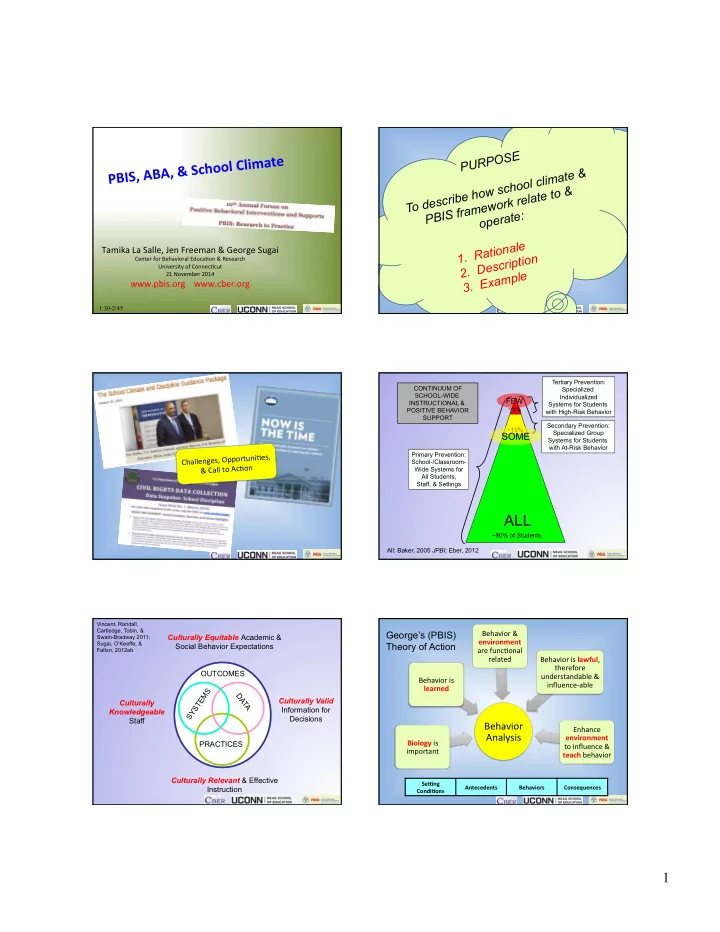

PURPOSE PBIS, ¡ABA, ¡& ¡School ¡Climate ¡ To describe how school climate & PBIS framework relate to & operate: 1. Rationale Tamika ¡La ¡Salle, ¡Jen ¡Freeman ¡& ¡George ¡Sugai ¡ 2. Description Center ¡for ¡Behavioral ¡Educa>on ¡& ¡Research ¡ University ¡of ¡Connec>cut ¡ 3. Example 21 ¡November ¡2014 ¡ www.pbis.org ¡ ¡ ¡ ¡www.cber.org ¡ 1:30-2:45 Tertiary Prevention: CONTINUUM OF Specialized SCHOOL-WIDE Individualized FEW INSTRUCTIONAL & Systems for Students ~5% POSITIVE BEHAVIOR with High-Risk Behavior SUPPORT Secondary Prevention: ~15% Specialized Group SOME Systems for Students with At-Risk Behavior Challenges, ¡Opportuni>es, ¡ Primary Prevention: School-/Classroom- & ¡Call ¡to ¡Ac>on ¡ Wide Systems for All Students, Staff, & Settings ALL ~80% of Students All: Baker, 2005 JPBI; Eber, 2012 Vincent, Randall, Cartledge, Tobin, & Behavior ¡& ¡ George’s (PBIS) Swain-Bradway 2011; Culturally Equitable Academic & environment ¡ Sugai, O’Keeffe, & Theory of Action Social Behavior Expectations are ¡func>onal ¡ Fallon, 2012ab related ¡ Behavior ¡is ¡ lawful , ¡ therefore ¡ OUTCOMES understandable ¡& ¡ ¡ Behavior ¡is ¡ influence-‑able ¡ learned ¡ SYSTEMS DATA Culturally Valid Culturally Information for Knowledgeable Decisions Staff Behavior ¡ Enhance ¡ Analysis ¡ environment ¡ Biology ¡is ¡ PRACTICES to ¡influence ¡& ¡ important ¡ teach ¡behavior ¡ Culturally Relevant & Effective Se<ng ¡ Antecedents ¡ Behaviors ¡ Consequences ¡ Instruction Condi=ons ¡ 1
edents ¡ Behaviors ¡ Consequences ¡ School ¡ Under-‑ STUDENT ¡ violence ¡ ADULT ¡BEHAVIOR ¡ OUTCOMES ¡ achievement ¡ BEHAVIOR ¡ . ¡. ¡. ¡. ¡. ¡. ¡. ¡ • Aggression ¡ • Office ¡referral ¡ • Dispropor=onality ¡ Suspension ¡& ¡ • Bullying ¡behavior ¡ • In ¡school ¡deten>on ¡ • Dropping ¡out ¡ expulsions ¡ School ¡ NOT Equal • Non-‑compliance ¡ • Out ¡of ¡school ¡ • School ¡failure ¡ School ¡ Climate ¡ suspension ¡ Climate ¡ • Insubordina>on ¡ • Mental ¡illness ¡ School ¡Reform ¡ • Proba>on ¡& ¡parole ¡ Disability ¡ • Social ¡w/drawal ¡ • School-‑to-‑prison ¡ Problem ¡Context ¡ • Arrests ¡& ¡ pipeline ¡ Substance ¡ • Truancy ¡ incarcera>on ¡ use ¡ • Achievement ¡gap ¡ • Law/norm ¡viola>ons ¡ • Restraint ¡& ¡ • Unemployment ¡ Dispropor>onality ¡ seclusion ¡ • Substance ¡use ¡ & ¡Equity ¡ Delinquency ¡ • Delinquency ¡ • Mental ¡health ¡ • Weapon ¡possession ¡ referral ¡ • ¡ ¡ ¡ • Harassment ¡ Restraint ¡& ¡ • ¡ ¡ School ¡ seclusion ¡ • Self-‑injury ¡ comple>on ¡& ¡ Bullying ¡ dropping ¡out ¡ • ¡ ¡ Logic Model ! • Surgeon General’s Report on Youth Violence (2001) CONTEXT • Coordinated Social Emotional & Learning STUDENT BEHAVIOR ADULT BEHAVIOR STUDENT OUTCOME Posi>ve ¡ CONDITIONS (Greenberg et al., 2003) • Hunger • Aggression • Office referral • Disproportionality • Center for Study & Prevention of Violence (2006) predictable ¡ • Bullying behavior • In school detention • Dropping out • Chronic illness • White House Conference on School Violence (2006) • Non-compliance • Out of school • School failure • Disability school-‑wide ¡ • Race • Insubordination suspension • Mental illness • Social w/drawal • Probation & parole • School-to-prison • Gender climate ¡ B Mul>-‑component, ¡ I • Truancy • Arrests & pipeline G • Violence & trauma ¡ I D E A • Law/norm incarceration • Achievement gap ! ! exposure High ¡rates ¡ ! ¡ RISK mul>-‑year ¡school-‑ violations • Restraint & • Unemployment • Unemployment • Substance use seclusion • Delinquency academic ¡& ¡ • Gangs family-‑community ¡ • Weapon • Mental health • • Substance use social ¡success ¡ possession referral • effort ¡ • Mental illness • Harassment • • VIOLENCE ¡ • Self-injury • • (Bullying ¡ • Behavior) ¡ • Employment • Problem solving • Teach, supervise, • Postsecondary • Physical health • Conflict & anger reinforce education PREVENTION ¡ PREVENTIVE-PROTECTIVES • Recreation management • Active supervision • Employment • Asking for • Check in check out • Family • Healthy diet Posi>ve ¡adult ¡ • Preschool assistance • Function-based • Recreation & • Literacy exposure • Communicating support leisure activities role ¡models ¡ Formal ¡social ¡ feelings • Positive • Physical & mental • Safe neighborhoods • Literacy reinforcement health skills ¡instruc>on ¡ • Self-management • Precorrection • Positive peer group • Positive role skills • Opportunity to • Safe neighborhood models Posi>ve ¡ac>ve ¡ • Managing bullying respond • • • behavior • Generalization • supervision ¡& ¡ • training reinforcement ¡ • • Data-based decision making • • ! Coercive ¡Cycle ¡ KID ¡ SCHOOL ¡ (-‑) ¡School ¡Climate ¡ (-‑) ¡School ¡climate ¡ • Non-‑compliance ¡& ¡non-‑ • Reac>ve ¡management ¡ coopera>on ¡ • Exclusionary ¡disciplinary ¡prac>ces ¡ • Disrespect ¡ • Informal ¡social ¡skills ¡instruc>on ¡ • Low ¡academic ¡achievement ¡ • Poor ¡implementa>on ¡fidelity ¡of ¡ • Teasing, ¡harassment, ¡& ¡ effec>ve ¡prac>ces ¡ in>mida>on ¡ • Inefficient ¡organiza>on ¡support ¡ • Disengagement ¡& ¡withdrawal ¡ • Poor ¡leadership ¡prepara>on ¡ • Nona`endance, ¡tardy, ¡& ¡ • Non-‑data-‑based ¡decision ¡making ¡ truancy ¡ • Inefficient, ¡ineffec>ve ¡instruc>on ¡ • Violent/aggressive ¡behavior ¡ • Nega>ve ¡adult ¡role ¡models ¡ • Li`ering, ¡graffi>, ¡& ¡vandalism ¡ • Substance ¡use ¡ Negative School Climates are Coercive Cycles (“Collections of Bad Habits”) 2
Recommend
More recommend